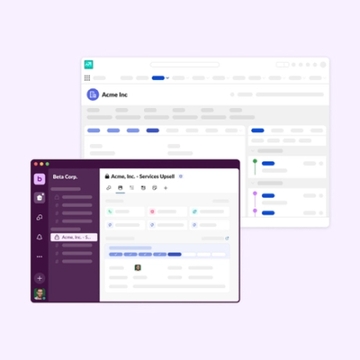Rock Content has big ambitions. “It’s our dream to be the biggest content marketing company in the world,” says Matheus Jiran, the company’s business enablement team lead. The digital marketing and content services provider, which was founded in Brazil in 2013, has a prominent position in Latin America as well as multiple Fortune 100 clients.
As a provider of digital services, Rock Content has to be a technology leader, starting with the tools it uses to run its business. In 2014, the company began using HubSpot, a CRM platform that includes marketing, sales, service, operations, and website management products to capture website leads.
In 2019, a few months before the pandemic began and after its acquisition of ScribbleLive, Rock Content adopted Slack company-wide. The timing was fortuitous because Slack allowed the company and its culture to continue to thrive despite the switch to remote work. Once Rock Content integrated HubSpot with Slack, the business enablement team enthusiastically added customizations to create an engine for driving sales growth.
Through the integration with HubSpot, Slack helps Rock Content convert leads into sales by giving team members a way to:
- Turn Slack conversations into HubSpot tasks
- Send notifications in Slack about reminders, customers and deal closes in HubSpot
- Save time with slash commands to search for and share sales and contact information in the HubSpot CRM, without leaving Slack

“We ran a program to educate people on communicating remotely, and Slack was a big part of it. Notifications, alerts, monitoring, everything that we could centralize in Slack channels worked better.”
Building culture in a remote-work world
Like most businesses, Rock Content underwent a massive transition to remote work in early 2020. In spite of such a big change, the company continued to attract new customers and even thrive in an uncertain market. So much so that Rock Content’s leaders, soon after the ScribbleLive acquisition, decided to make the shift to remote work permanent.
“People swore by Slack at ScribbleLive,” Jiran says. That enthusiasm for Slack, coupled with the positive feedback from Rock Content employees who’d used Slack at previous jobs to collaborate with coworkers, drove Slack’s adoption. During the early months of remote work, Slack helped Rock Content workers meet the challenges of working and meeting asynchronously.
“We put a lot of effort into showing people how this could work,” says Jiran. “We had people spread all over the world—Europe, India, the United States and Canada. We ran a program to educate people on communicating remotely, and Slack was a big part of it. Notifications, alerts, monitoring channels, everything that we could centralize in Slack channels worked better.”
Tracking sales leads and sales performance in Slack
Jiran and the business enablement team brainstormed about ways to bring sales and marketing into Slack, like by integrating Slack with HubSpot. Rock Content decided to use the out-of-the-box HubSpot app as well as create custom integrations to suit the company’s unique needs, like delivering instant HubSpot notifications in Slack about new qualified leads.
“Every time a marketing qualified lead (MQL) converts to a sales qualified lead, HubSpot posts in Slack to make sure the lead is assigned to a sales rep,” Jiran explains. “When a customer is onboarded, we have a post to celebrate that. And we get notifications about the progress of marketing campaigns. We can click on the link in the Slack notification and go right to the HubSpot record.”
The notifications in Slack affect the sales team differently than a simple report. “It’s one thing to see a dashboard with the number of MQLs,” Jiran says. “But when we see the email domain and the job title of that MQL, the reaction is quicker and stronger.”
Jiran sees the Slack-HubSpot integration as a “control panel” for geographically dispersed marketing and sales teams that need to track campaigns and prospects. “Slack is my dashboard, and I know that a notification will pop up in Slack when I need to take action,” he says.
“Now we see the Americans and Canadians celebrating in Slack like the Brazilians do–becoming very engaged and very happy.”
Slack engagement creates a well-informed global team
Jiran describes Rock Content’s culture as similar to that of the company’s home country, Brazil. “We’re very passionate about our work, and very close to each other,” he says. “We worried about keeping that culture alive when we started to work remotely—how would we create the same environment that we had in our offices?”
The Slack-HubSpot integration is fueling the collaborative, energized culture in the remote-work environment, and even spreading the Brazil vibe to coworkers outside the country.
“We’re always available in Slack to share and support each other, and to celebrate in the #revenue-movements channel when a sales rep books a new deal,” Jiran says. “Now we see the Americans and Canadians celebrating in Slack like the Brazilians do–becoming very engaged and very happy.”
Slack channels for business enablement have multiplied since the HubSpot integration. There are channels for customer service and support, and even a channel for sharing pictures and stories about pets.
The collaboration in Slack is essential to Rock Content’s ambitious plans to become a giant in the content delivery market. “Our whole company is in Slack all day, so when you engage with people, you know others will see it,” says Jiran. “Each thing you can do in Slack helps drive engagement with our coworkers, whether it’s celebrating a family event or keeping tabs on a newly launched campaign.”















